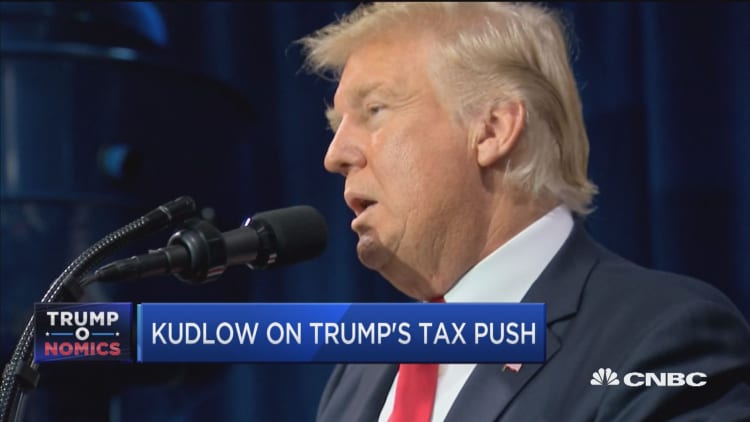
August's jobs number was doubly disappointing — with weaker wage growth and less job creation than expected.
Economists, however, blame the smaller-than-expected payroll gain of 156,000 on a quirky historic pattern of weaker August job growth.
According to BlackRock, August jobs have fallen short of expectations for 12 of the last 16 years, as it appears to be a slower hiring period. But whether that's the reason remains to be seen, since September and October job creation is not expected to spring back that much because of Hurricane Harvey's negative effects.
The lack of wage inflation is harder to explain, but economists do not expect it to stop the Federal Reserve from either raising interest rates later this year, or beginning the process of shrinking its massive balance sheet at its meeting later this month.
The expectation was that wages would rise 0.2 percent, but August wages grew just 0.1 percent, or an annualized pace of 2.5 percent. The slow wage growth matches the sluggish inflation seen in other measures, including the PCE deflator watched by the Fed. Core PCE rose just 0.1 percent in July, or an annualized pace of 1.4 percent, well below the Fed's 2 percent target.
Jan Hatzius, the chief U.S. economist at Goldman Sachs, said there are other signs that wages are picking up, and they will ultimately show up in the employment report. "My expectation would be over the next six months, or so, we'll get a rebound in the wage number, moving toward 3 percent," he said on CNBC.
Hatzius also sees a better than 50 percent chance that the Fed cuts interest rates in December, as many economists expect. But each low inflation or wage reading fuels the debate about the Fed. "I think that's the argument for staying on hold in December, and that's entirely possible, but our expectation is they do go in December," he said, adding that the real economy is strong.
Goldman economists had expected 160,000 jobs in August. The consensus was 180,000, and in addition to missing that forecast, the jobs report included revisions removing more than 40,000 jobs from reports in the prior two months.
Steve Rick, chief economist at CUNA Mutual Group, had expected the wages to grow even more than the consensus forecast. "It looks like the underlying trend is not as robust as we thought it was," he said. "For some reason there is still a lot of slack out there in the labor market."
There was a silver lining in the August report. Diane Swonk, CEO of DS Economics, said the growth in manufacturing jobs was the best since 2012.
"The composition of gains was much better. 36,000 in manufacturing and 28,000 in construction. That helped the wages so we hold at 2.5 percent from a year ago. Otherwise we would have fallen short," she said, noting workers in those fields are higher paid.
"I was expecting a lower payroll number," she said. "August tends to be a fluke month. The question is what kind of distortions we'll see next month with Hurricane Harvey."
Economists expect to see a hit to the September and possibly October reports. Barclays chief U.S. economist Michael Gapen estimated that payrolls could be reduced by roughly 75,000 jobs because of Harvey. In the year that Katrina hit the Gulf Coast, along with two other storms, 200,000 jobs were lost in September and October, he said.
WATCH: Kudlow on Trump's economic policies



